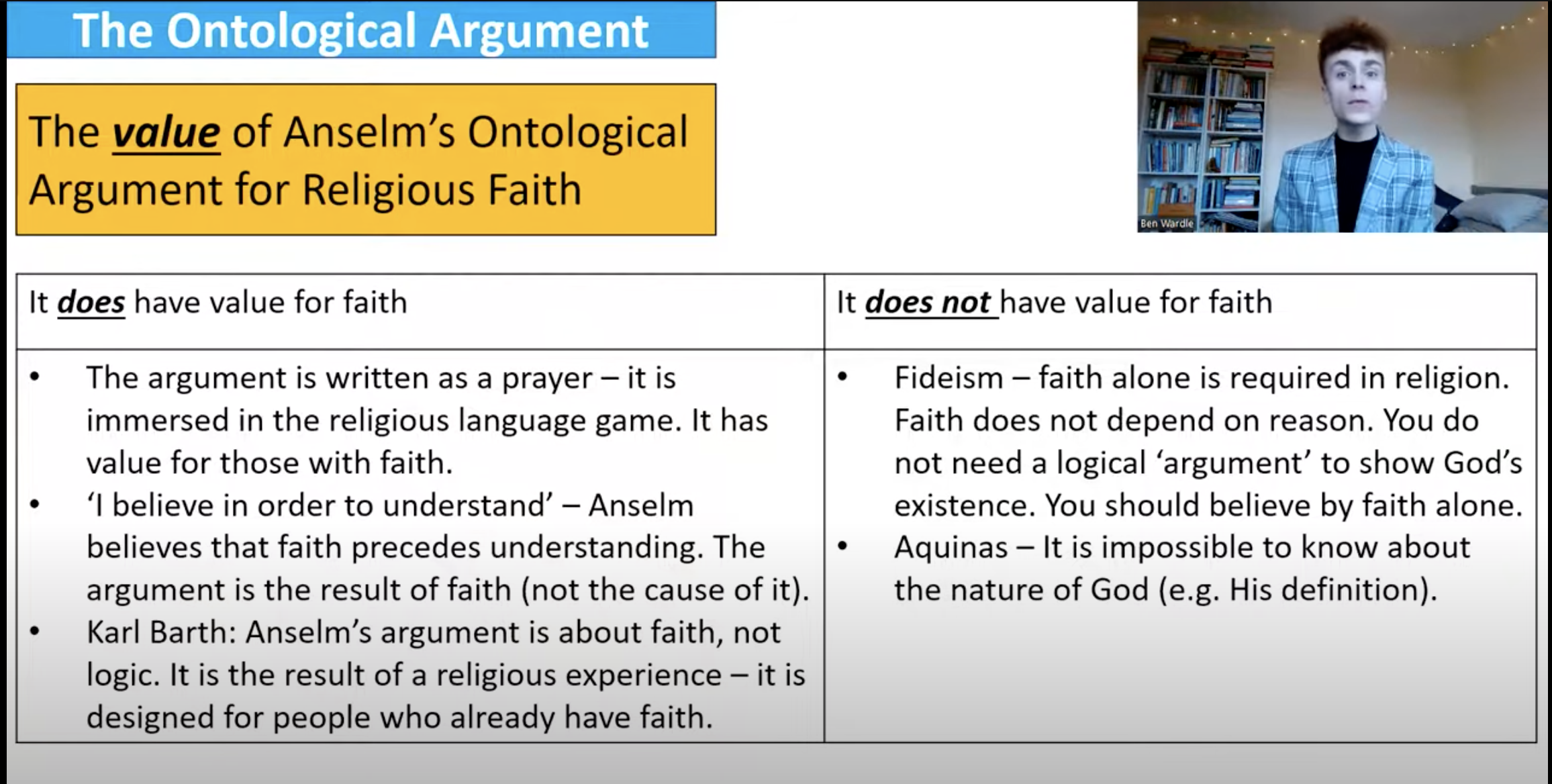AQA philosophy- ontological argument
1/16
Earn XP
Description and Tags
Name | Mastery | Learn | Test | Matching | Spaced | Call with Kai |
|---|
No analytics yet
Send a link to your students to track their progress
17 Terms
what type of argument is it
a priori: based on logical deduction, a rational argument
deductive: guarantees the truth of the conclusion (if the premises of the argument are correct, the conclusion must be true)
what type of statement is it
analytical: a statement that is true by definition (eg: a triangle has 3 sides)
“the fool says… there is no God”
ontological argument is a direct response to this quote. If the fool talks about God not existing, he must already have a concept of God
quote that shows Anslem already had faith (the argument is a prayer)
“I believe in order to understand”. He is a theologian so he already had faith (theistic language game). Belief should precede understanding
how does the ontological argument argue the existence of God
by definition God must exist, once he’s correctly defined, you can’t doubt his existence
what are the 5 premises of the 1st ontological argument
“God is a being than which nothing greater can be conceived”
even the fool who denies the existence of God can accept this definition
there is a difference between having an idea of God in the mind and knowing that He exists in reality
it is greater for God to exist both in the mind & reality
if God only existed in the mind, you could think of something greater than God that exists in reality
conclusion: God necessarily exists because you can’t conceive of something greater than God
who criticised the 1st ontological argument
Gaunilo (theist). Believed that Anselm’s argument was flawed
premises of Gaunilo’s perfect lost island
it’s possible to conceive the most perfect lost island
it’s greater to exist in reality than only in the mind
conclusion: therefore, the most perfect lost island must necessarily exist in reality
how does The Perfect Lost Island criticise Anselm’s argument
reductio ad absurdum & overload objections:
reducing the argument to absurdity
there are many a posteriori (you can see that it’s not true) examples of how absurd the argument would be if it was taken as true
how does Anslem respond to Gaunilo
Gaunilo is talking about contingent things (can’t exist necessarily), God isn’t. Necessary existence is only a predicate of God, and not of things.
what are the 5 premises of 2nd ontological argument
either God exists or He doesn’t
If He exists, His existence must be necessary “God can’t be conceived not to exist”
only contingent things and logically impossible things can’t exist (eg: square circles)
God is not a logically impossible thing, there are no logical contradictions
God is necessary
conclusion: His existence is the only possible state left
support of 2nd ontological
Descartes
how does Descartes define God
“the supremely perfect being”. Therefore he must posses existence
how does Descartes support 2nd ontological (quote)
existence is part of the essence of God. In the same way a mountain can’t be separated from a valley, God can’t be separated from existence “existence can no more be separated from the existence of God”
strengths of the ontological argument
it has certainty since it’s a deductive argument
doesn’t rely on empiricism/observation. Avoids the problem of us not being able to trust our senses because they deceive us. Plato “the body is a source of endless trouble for us”. We can ensure that the conclusion is true, if it succeeds than its an absolute truth that God exists
supported by Descartes
more up-to-date piece of support from a high-profile philosopher which gives more credibility
weaknesses of the ontological argument
Gaunilo’s perfect lost island
1st ontological argument can be used to prove an endless number of perfect objects “the real fool is anyone who argued something into existence this way”
Anselm’s counter: his argument only works for necessary beings, not contingent. Then he made 2nd ontological argument
Kant responding to Descartes
existence is not a predicate. Saying God exists adds nothing to our understanding of his essence; real predicates add to our knowledge. Logic alone is insufficient, we need sense experience to truly understand that something exists
language games: the argument depends on accepting Anselm’s definition of God
his 2nd premise assumes that even the fool (an atheist) accepts his definition of God but this isn’t true. The argument requires religious faith, someone has to be part of the same language game as Anselm (subjective argument). For atheists, this argument doesn’t prove the existence of God because the 1st premise fails
Karl Barth (neo-orthodox): argument was a result of a religious experience Anslem had, so it can’t be truth. The argument is about faith not logic
ontological has vs. hasn’t got value for religious faith
